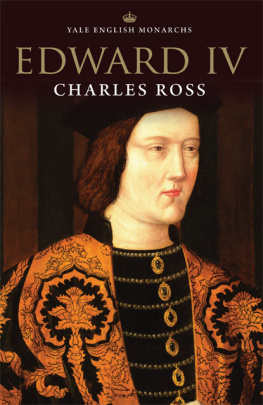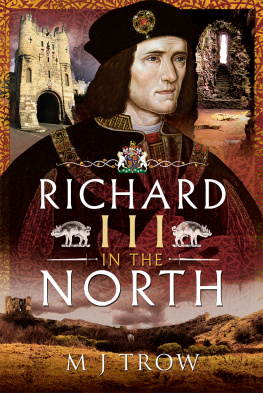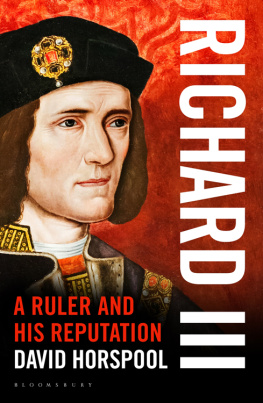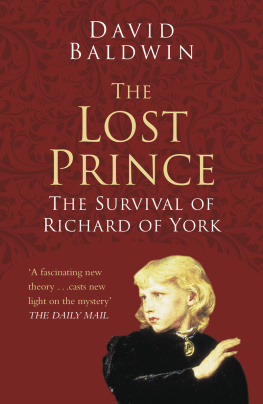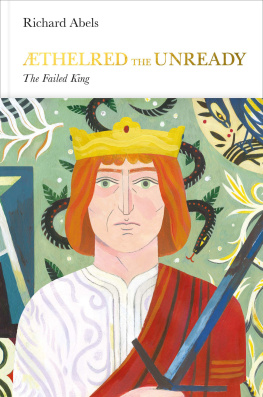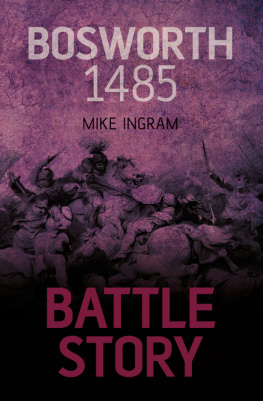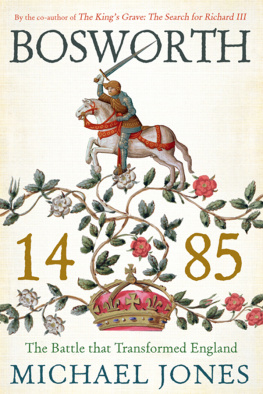
Also in the Yale English Monarchs Series
ATHELSTAN by Sarah Foot
EDWARD THE CONFESSOR by Frank Barlow
WILLIAM THE CONQUEROR by David Douglas
WILLIAM RUFUS by Frank Barlow
HENRY I by Warren Hollister
KING STEPHEN by Edmund King
HENRY II by W. L. Warren*
RICHARD I by John Gillingham
KING JOHN by W. L. Warren*
EDWARD I by Michael Prestwich
EDWARD II by Seymour Phillips
RICHARD II by Nigel Saul
HENRY V by Christopher Allmand
HENRY VI by Bertram Wolffe
EDWARD IV by Charles Ross
RICHARD III by Charles Ross
HENRY VII by S. B. Chrimes
HENRY VIII by J. J. Scarisbrick
EDWARD VI by Jennifer Loach
MARY I by John Edwards
JAMES II by John Miller
QUEEN ANNE by Edward Gregg
GEORGE I by Ragnhild Hatton
GEORGE II by Andrew C. Thompson
GEORGE III by Jeremy Black
GEORGE IV by E. A. Smith
Available in the U.S. from University of California Press

First published in Great Britain in 1981 by Eyre Methuen Ltd
First published in paperback in 1988 by Methuen London Ltd
This edition first published by Yale University Press in 1999
Reprinted in 2005, 2011.
Copyright 1981 Charles Ross
New edition 1999 The Estate of Charles Ross
New Foreword 1999 R. A. Griffiths
All rights reserved. This book may not be reproduced in whole or in part, in any form (beyond that copying permitted by Sections 107 and 108 of the U.S. Copyright Law and except by reviewers for the public press), without written permission from the publishers.
Printed in Great Britain by Good News Digital Books, Ongar
Library of Congress Catalog Card Number 99-61167
ISBN 978-0-300-07979-1 (pbk)
A catalogue record for this book is available from the British Library.
FOR JAMES ALEXANDER ROSS
CONTENTS
ILLUSTRATIONS
MAPS
GENEALOGIES
The maps and genealogies were re-drawn from the authors roughs by Neil Hyslop.
FOREWORD TO THE YALE EDITION
by R. A. Griffiths
At the time of its publication in 1981, Richard III seemed a brave and self-confident book. It was self-confident because Charles Ross (who died in 1986) was aware that the approaching quincentenary of Richards accession, reign and death was bound to herald an explosion of writings about a king who has fascinated the English-speaking world since the battle of Bosworth in 1485; yet he felt it timely and himself ready to address those issues that are crucial to any assessment of Richards place in English history. It was a brave book because Charles Ross was also aware (gleefully so at times) that his study of the king indeed, any study of the king, especially one that aimed to be scholarly and dispassionate would arouse intense interest and raise a number of hackles; on its publication, it amused him to receive a threat of a libel suit from one devoted Ricardian, as if on behalf of the dead king himself! Richard III may not seem quite as entirely satisfying a study as Rosss Edward IV, which had appeared in 1974. How could it be when the context into which Richard as a late-medieval ruler needs to be fitted is a reign that lasted only two years; when the details of actions and attitudes that are necessary to the writing of biography are, in Richards case, often lacking; when Richard and his times have been the source of persistent myths and legends that are still vigorously and vociferously defended; and when, as Ross himself perceptively noted, much of what occurred at the time of Richards seizure of the crown in 1483 took place in an atmosphere of rumour, suspicion, propaganda exercises, plot and counter-plot. Only those at the centre could be fully aware of what was going on
Nevertheless, Richard III is a landmark in the study of the king and in the development of historical writing about late-fifteenth-century England. It provided an appropriate colophon to Rosss study of Edward IVs reign, which had come to an end somewhat unexpectedly and when some of Edwards achievements seemed to be imperilled. Its judgements are clear and its sheer common sense has promoted focussed and rational writing about the king since 1981. Yet few of Rosss significant interpretations have been challenged effectively and none of his chapters has been rendered redundant. The book remains the most compelling portrait of the king and his actions and it still provides the surest foundation for further study of his reign.
Since 1981, a number of writers have sought to digest, rearrange or reinterpret the body of sources which Ross used, supplemented by a modest number of discoveries made since then. These interpretative studies often make for readable books and essays, though in large part they rehearse well-known plausibilities in relation to Richards character, shift emphases to understand his motives, and adjust verdicts on his brief rule, taking in a stitch here, letting another out there. No historian or Ricardian enthusiast would willingly accept that.
Knowledge of Richard and his times continues to be enhanced by contributors to that at once loveable and provocative organ of the Richard III Society, The Ricardian, under the devoted editorship of Anne Sutton. Its articles are usually brief and detailed rather than substantial and sustained: to quote Sir Lewis Namier writing in a different context, Here is an ant-heap, with the human ants hurrying along their various paths. The Ricardian, to which Ross himself contributed a piece, regularly releases a mass of information and opinion about individuals and events and oft-neglected sources which is frequently relevant to the major themes of Rosss
Ross was also aware of the house books of the city of York, which chart Richard IIIs close relations with the northern capital before and after he became king; in 1991, the Trust published a full edition of the books for the period 146190.
Among the narrative histories of the reign, the continuation of the Crowland Abbey Chronicle was judged by Ross to be the most important single source for the reign as a whole.
Ross realized that, for a reign which lasted only two years, it was more appropriate and fruitful to concentrate on Richard III himself rather than on attempting to assess what was distinctive about his rule. That being so, no historian can ignore Shakespeares dramatic, providential portrayal of the king as an archetype villain, exceeded only, in consummacy and subtlety, by Iago in the Shakespearean canon.
Since 1981, no additional comparable narrative or major body of personal correspondence has come to light, although the re-evaluation of well-known sources continues apace. Antonia Gransdens discussion of the narrative sources for the Wars of the Roses, including Richards reign, provides a reliable and detailed guide: she does not depart significantly from Rosss assessments.
The closest that historians have come to assembling a body of state papers which would (in Rosss words) transform our knowledge of [the Yorkist periods] inner dynamics, and whose absence was deeply regretted by Ross in 1981, is a substantial collection of materials relating to the coronation of Richard III on 6 July 1483. This volume sheds light on the administrative background to one of the most important events in Richards life, and, by the way, reveals much detail about those who served him in his household and frequented his court. In short, the pessimistic view of Giles St Aubyn need not be a counsel of despair, but it is doubtful at present whether any substantial modification of Rosss interpretation of sources, individuals or episodes is warranted, at least in so far as the main narrative of Richard IIIs life and reign is concerned.
Next page

